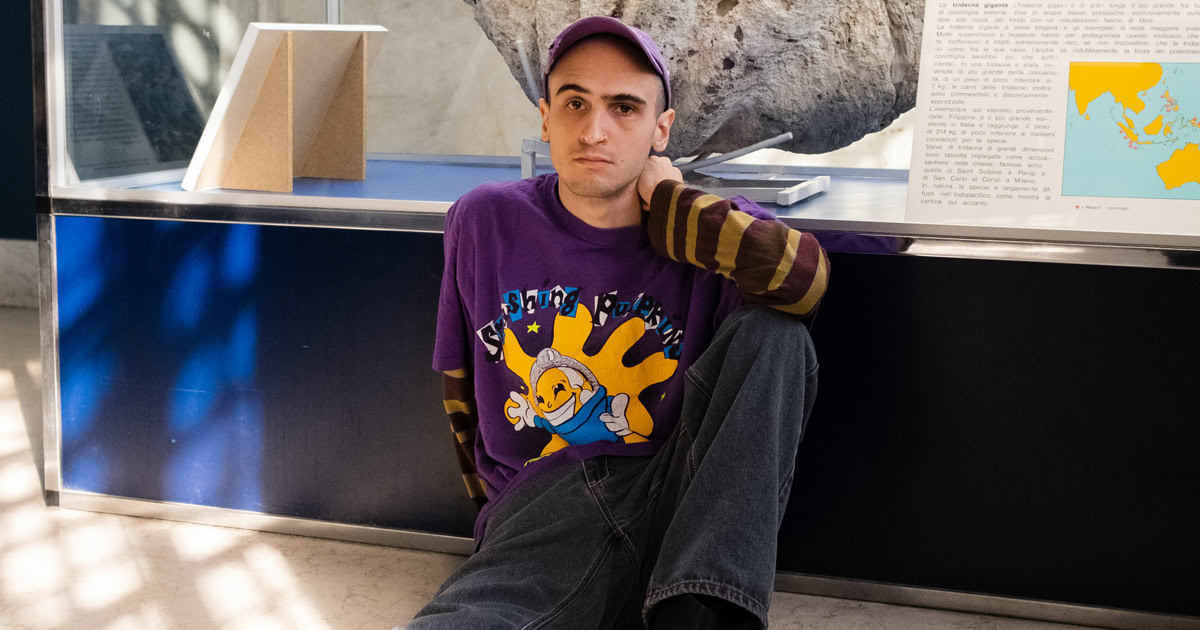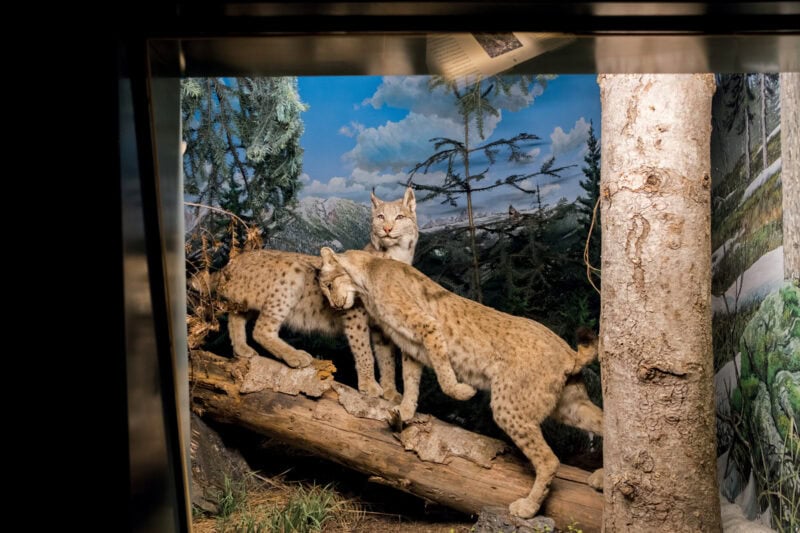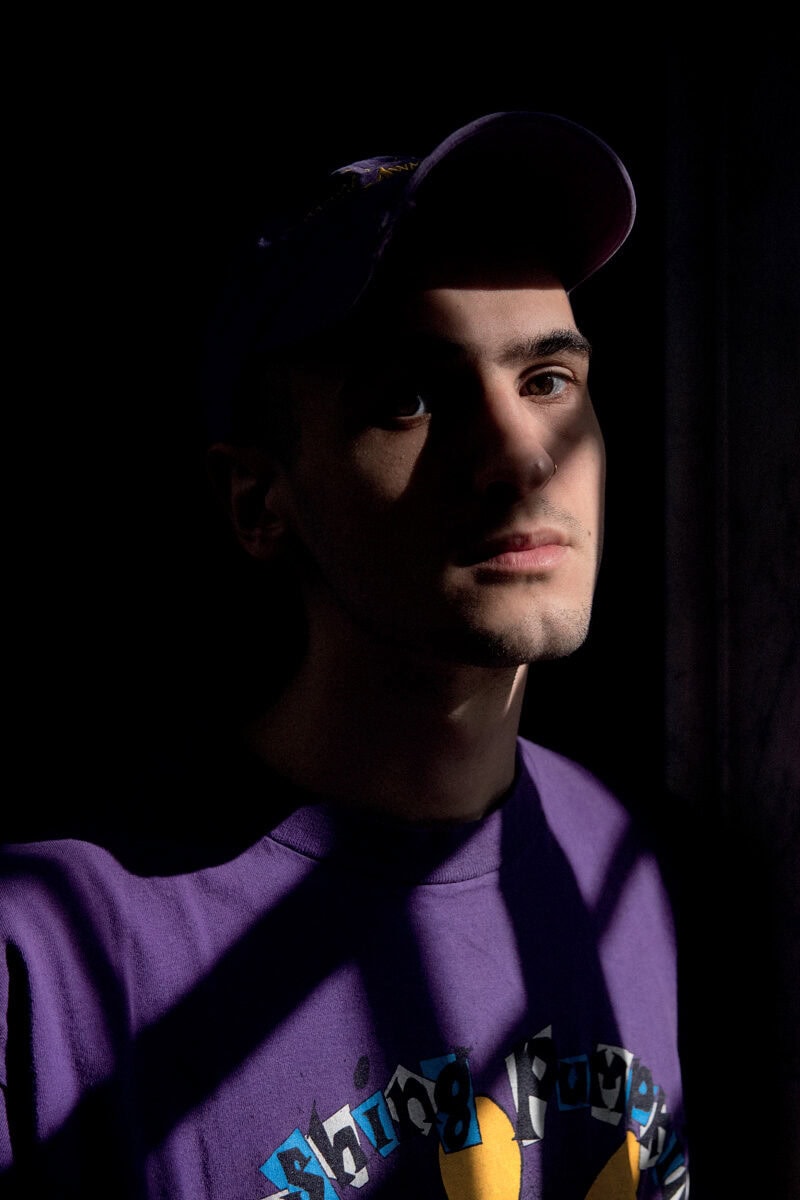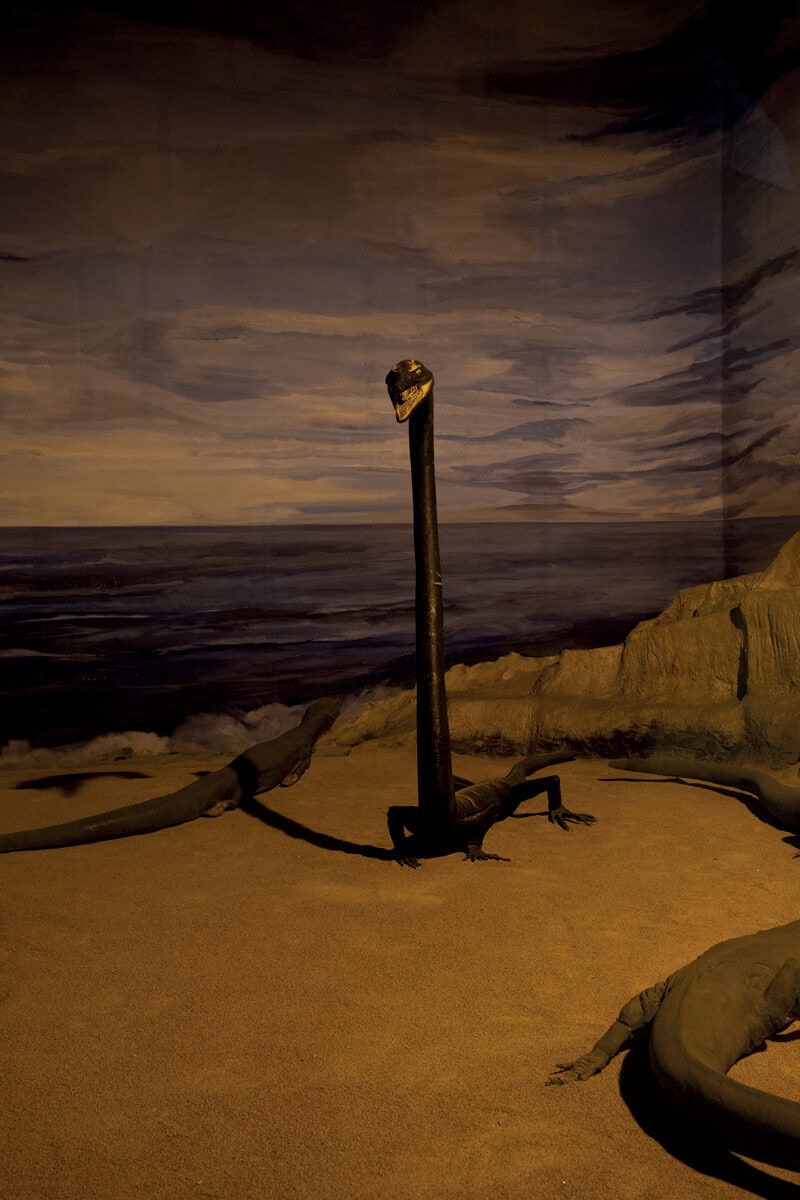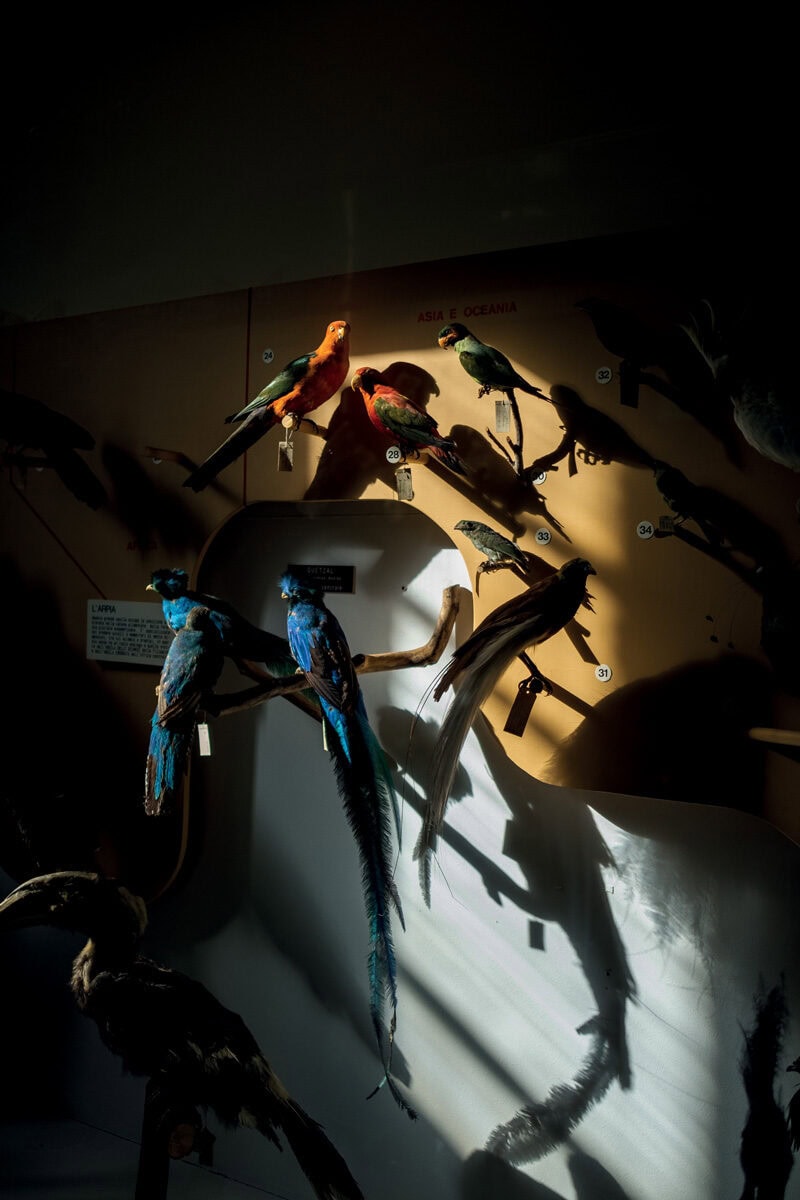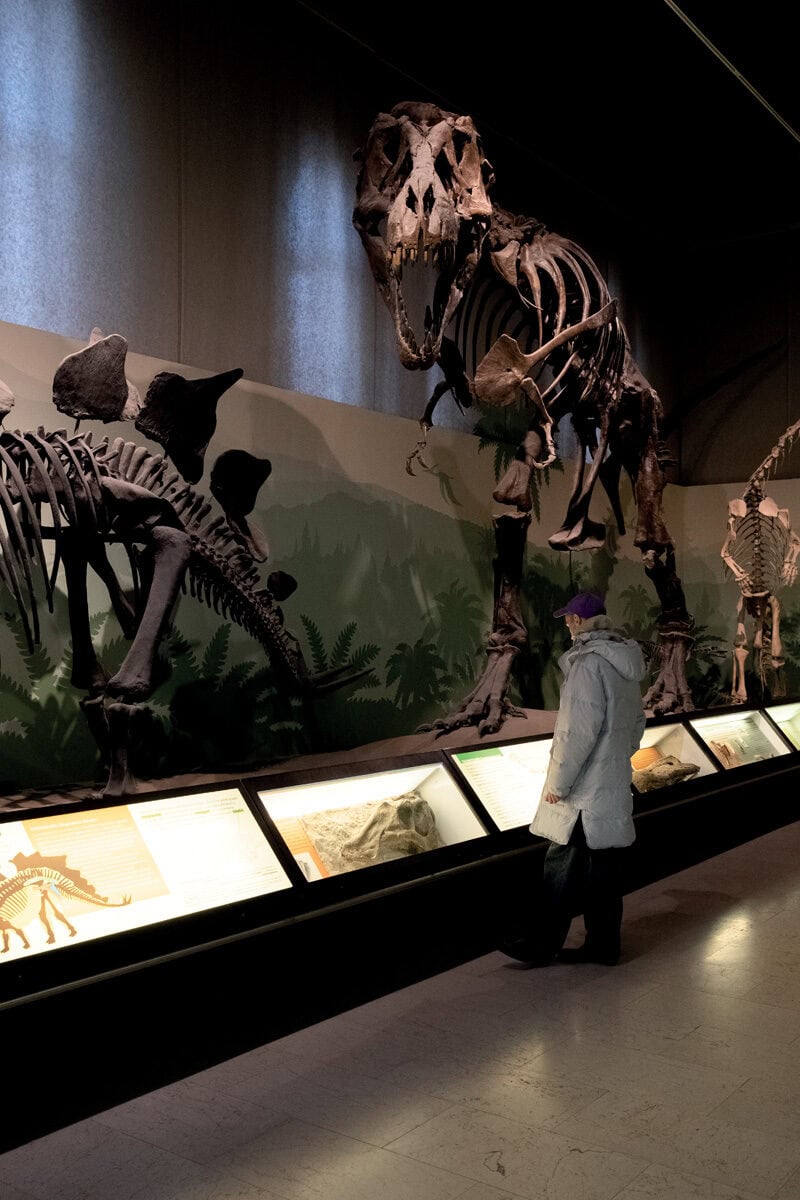The first thing I notice about Luca is his violet Awake cap. It suddenly makes me think of the song of the same name by Leute and I can’t believe that it’s mere coincidence. When the song was released, Luca had just become Generic Animal. Around the same time, I was feeling about as rough as his drawings. Belonging to no genre or species, I used to see myself in the animal that looked like a dog but wasn’t in the end. I think we’ve both grown up a bit now, and I’m curious to know if the animal has become any more specific – or at least, less pained. Trying not to mention this, I ask Luca if he has picked a location for our shoot. He guides us towards the Natural History Museum and I immediately have flashbacks to the days of school trips. I soon realise that it’s the perfect setting. We’re surrounded by dioramas recalling Luca’s imagery. There are bee tables, extinct animals, overexcited children… Now, I’ve never been inside one of his dreams, but I would imagine they’re pretty similar – or at least equally 90s-looking. Now I come to think of it, I forgot to ask him about that, but we’ve planned an email-interview for anything I left out.
Your artistic evolution seems to speak, above all, of gradual self-awareness. From the provincial boy – still waiting for someone to throw a stone at his window – to the emoranger, who is his own worst enemy, yet finally recognises and forgives the person in the mirror. Today you say that you no longer know anything about yourself, that you are nothing special. But one listen is enough to realise that couldn’t be further from the truth. Who is Generic Animal today and where is he going?
That’s a pretty tough question. I’m well aware of who I don’t want to be and what I don’t want to do; I head towards where I feel most wanted and loved. I am constantly seeking balance, serenity, and clarity. Both for myself and those who see me from the outside.
Nevertheless, I am who I want to be. Nothing more or less than what you see or hear. I still feel envy, I admire beautiful things like an impassioned fan and take inspiration from them, learning from them and letting myself be influenced.
The first track of the album starts with a line that immediately takes your breath away “È per il brivido ed il rischio / Che da bambino tiravo sassi / Agli alveari, agli alveari” (“It was for the thrill and the risk / That as a child I used to throw stones / At the hives, at the hives”). I’m assuming you don’t do that anymore, so where do you get your thrills nowadays?
I get that feeling when I go back to the places I frequented during my childhood. I find it in not knowing how much I remember of the way they were or the way I’ll find them once I’m there.
The album is called Presto and the title evokes a certain rush, both generational, and personal. Where did this name come from? Do you think of it more as a point of departure or arrival?
Months and months after writing the title track, I noticed that it was this little word that brought meaning to the rest of the album and the song itself. Sometimes waking up early is a sign of good health, of order, of making the most out of your day; sometimes it only represents frustration at being early for something or maybe not having slept at all. It is definitely a point of departure from which I have moved forward and from which I am disengaging myself with the release of the album. It is a reminder to myself to live more in the present, not before or after, and to stay centred.
In the Presto music video, you look like a purple alien, blending into the lilac subway. The fisheye distortion, your unfocused gaze, and the 3D effect all make the video feel a bit suspended and unreal. But everything is normal again by the end. Do you often find yourself in that kind of loop? And why the purple?
It is a loop that I have been in since starting this project. Changing shape, being flexible.
Purple is a colour that has always been present both in the way I dress and in my graphic imagery – back when I was still making my own covers. It might have been on the sidelines, but always there. It is a cloudy yet sincere and melancholic colour.
The album cover features you in various guises. You’re on the TV, but you’re also the boy lying in bed. The boy who never goes out, who stays at home in his pyjamas, looking for answers he won’t find on a smartphone screen. There are drawings on walls, hearts pierced by bullets. It almost feels like a declaration of loyalty to yourself, and to what has been. I really like it. But what about that tooth?
The tooth is meant as a symbol rather than an object or a bone. It crops up throughout the disk to pay tribute to my adolescence, which is linked to dental school and my dad, who is still a dentist to this day.
You recently opened for Gazzelle in Assago. How was the transition from your bedroom to large stages? What really changed – the stage, the audience or you?
Opening for Gazzelle was extremely exciting, I hadn’t played live for a long time and I went with Michael, who will be playing in my band for the tour as well. I felt loved and heard.
My audience evolves and increases. Sometimes they still struggle to understand me, but I change too, so we’ll have to see where the point of intersection is.
Generic Animal no longer takes to the stage alone: you are accompanied by a band this year. It almost feels like a return to your roots –nights in the rehearsal room, lifelong friends. What does it mean for you? What can (and can’t) you tell us about those moments?
The fact that I have a small trusted orchestra of friends who fully understand my journey and my songs makes me feel like I’ve grown a lot musically speaking.
The moments you mention are long gone however, and I have also lost my hair. But I will never forget that 10-day-tour in Poland and Czech Republic with my first post-hardcore band (along with Fight Pausa). I was 15, we had at least 3 days off, and it was my first visit to a strip club.
Sometimes moving forward means, somehow, denying one’s past – going beyond it – but it is our history that tells us who we are. How has your past affected the artist you are now? Do you think there were clues to the path you would take? Would you change anything if you could?
I think that my true colours have always shone through. I like to think about this on a chromatic and graphic level. My project has always been yellow, green, and purple. The dog on my first record was yellow, Emoranger was green and Presto purple. But the latter has always provided a contour to the first two, a filler or an outline. Now, all these colours have their own precise position and value. From Jacopo’s texts, to Zollo’s production, and now Fight Pausa. They have all become bristles on my brush.
The music you make today doesn’t fit into a specific category. It is part of a genre that is undergoing a strange transformation, revisiting both indie and trap and opening up to old and new contaminations. We might call it a sort of Italian musical renaissance. Do you think a definition is needed? Or is it time to take more expressive liberties, without necessarily having to explain them?
I believe that definitions are needed to describe everything that we don’t have time to totally listen to. And of course, music platform editors need them for their playlists. I don’t know if we need more words for genres here in Italy, or whether we just need to do better. To work more on content and then on the form that follows that content, instead of just throwing everything into two separate toilets.
In Italy, I am “strange” and I “need more than one listen”. It’s frustrating on the one hand, but as you said in the question, I think it’s time to grow and take the true liberty of not giving a damn.
What do you see in the future of Italian music? And what would you like to see?
I see the light [laughs]. There are projects that, in my opinion, are starting to breathe new life into Italian music: 72 Hour Post Fight, So Beast, Venerus to name a few.
But I have less and less interest in listening to people’s fake stories, brisk theatricality, or ostentation. Italian is a narrative language and I end up further and further away from that world, closing myself in with my own way of writing, which is hyper real and descriptive. Although in the end it is a mechanism that affects me, I think that the major labels have a great economic filter in their hands right now. And kids just fall right into it.
What is the main drive behind your artistic creation? What is it that makes you pick up your guitar or put your thoughts down on paper? What has changed since you started writing your own lyrics?
First of all, it’s the best thing that I can do for myself. Then, when I realized that other people also thought it was the best thing I could do with my thoughts and musical talent, I realised that I could go on forever.
How do you combine the intimacy and the emotional charge of your songs with a musical production that must still try to appeal to a broad crowd, if not to everyone?
That depends on the producer I choose to involve. One thing always comes through more than the other in the final result.
In a way, your music speaks sincerely and without pretence of a generation’s disillusionment, which is why it is so easy to see ourselves in your songs. But there is always an escape route. Something that saves us from all this confusion: something clear. It is in the words, but especially in the music. What are your short-term solutions, the moving landmarks that guide you through this mess?
Escaping helps me find my bearings. Traveling, leaving. I also find it scary to step away like that, perhaps while I’m working on big things, and I often end up succumbing to anxiety. But lately, taking small breaks has really helped me to find my way.
You speak of a world that is going haywire, without ever being over the top. “Avrei voluto tanto esserci, ma / Ormai i ghiacciai, non li vedrò mai” (“I wish I could have been there, but / I’ll never see the glaciers now”). The hives. You add in that touch of honest selfishness that opens people’s eyes. It’s almost sneaky, but it works. What do you think are the problems of our time? Why is it so hard for us to recognise them?
The way we use information. Our concentration. Increasingly emotionally driven values that no longer underpin our daily life. Honestly, I don’t feel qualified to point out the problems in the world and society. I am as much a part of the problem as I am not.
“E non è come l’università / Ne sbaglio due, cancello e si rifà” (“And it’s not like university / Mess up, erase and start over”). What was it like running headfirst into adult life? Painless, or more like banging your head against a brick wall?
It was a pretty gradual process, more like breaking a rib. You feel pain inside, it’s hard to move and breathe, but it is a pain that gradually fades.
It touches my heart when you say you still listen to My Chemical Romance every now and then. Do you think guitars can still conquer all in 2020? (Please say yes!)
Yes, just listen to my new record 😉
P.S. If the animal became specific, what animal would it be?
I went to Tokyo recently and got obsessed by the white-chested bear, also known as the moon bear. So, him.
Last time we met, everything was just about to take off. You were ready – a little early, as always – for what lay ahead. A little early, like the album name, Presto, but some things are hard to keep to yourself, you want to shout them out to the world.
There was a new album that I needed to get out of the bedroom; tracks heard in headphones that had to be sung together, in out-of-tune choirs to vent everything that was wrong. And then there it was, a global pandemic that put a full stop in the middle of the sentence and broke off everything still to come. It is something that can only be seen under a microscope, yet it had the power to change everything. In the shortest space of time, it managed to completely reconfigure a reality that we had always considered untouchable. It locked us up in our houses alone, looking through the window at a world that no longer resembled what we used to know.
For a moment there, it felt like we were in a trailer for the apocalypse. How did you react personally? What did you do to get through it?
I find it hard to remember[laughs], it feels like we are talking about something that happened years ago. I didn’t really process it until the end of March actually, when the situation became very serious. I got through it by cooking a lot, I created my own little at-home routine that I tried to stick to. I didn’t think about music initially.
After the initial impact, we all had time to rationalise. We’d cancelled all our plans for 2020 (or maybe just postponed them to 2021, who knows…) but it was time to start making some new ones. Comfortable chair, blank sheet of paper, and a struggle to hold back the tears. At least, that was what it was like for people who had to rethink everything like you did. “You know what kind of plan never fails?” “No plan” – they say in Parasite. How have your plans changed? What did you learn from all of this?
Parasite was the very first movie I watched in quarantine. Let’s say that from a certain point of view it reflected very well that growing feeling no longer being worth fuck-all to anyone.
My plans are evolving, adapting, and expanding as this course of events plays out. I’m learning to choose for myself. I just think about what I want to do without thinking about the competition all around me or who people prefer listening to, because this moment of crisis and cultural deprivation has shown me that only I can define myself and the value of my music.
The end is in sight now, but we all know that the road is still long. How do you think the world of music will respond? What will change forever and what will go back to the way it was?
The music scene in Italy has just got even worse in my opinion. While before it was intellectually poor, now it is also economically poor [laughs]. But I think we have all been very good and very patient. I hope things will change and we will see more quality content, an improvement in the way that people enjoy music and hopefully music will become less disposable than it has been in the last 3 years at least. On a personal level, this moment has given me much more patience and recognition for the work that I have done and that I do, although there has been no public reward or promotion yet, but maybe that doesn’t matter. Many companies are endeavouring to bring concerts back to a half normal level and that will be the first real change.
We all agree that the music scene didn’t have to be that way and starting over will inevitably be different – perhaps even more special than it might have been otherwise. What will the starting point be for you?
I am recording some new songs with all the calm in the world. I actually wrote them in September 2019, almost immediately after finishing Presto. But I’m recording them with a different mentality, in a truly peaceful place, in a studio/cabin above Lake Lecco. A bit like the way we did it with Leute. In July, I will play an acoustic set at the Trento Science Museum.
Credits:
Words by Robin Sara Stauder
Photography by Riccardo Fantoni Montana
Starring Generic Animal
